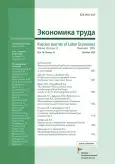Employee innovative behavior: competence approach
- Authors: Dashkova E.S.1, Dorokhova N.V.1, Fedchenko A.A.2, Buntovskaya L.L.3, Baltacheeva N.A.3
-
Affiliations:
- Voronezh State University
- The Financial University under the Government of the Russian Federation
- Donetsk State University of Management
- Issue: Vol 10, No 11 (2023)
- Pages: 1705-1718
- Section: Articles
- URL: https://journals.eco-vector.com/2410-1613/article/view/625115
- DOI: https://doi.org/10.18334/et.10.11.119794
- ID: 625115
Cite item
Abstract
About the authors
Ekaterina Sergeevna Dashkova
Voronezh State University
Email: dashkova-82@mail.ru
Natalya Vasilevna Dorokhova
Voronezh State University
Email: nv_dorohova@mail.ru
Anna Aleksandrovna Fedchenko
The Financial University under the Government of the Russian Federation
Email: faa1711@yandex.ru
Larisa Leonidovna Buntovskaya
Donetsk State University of Management
Email: l.buntovskaya@mail.ru
Nailya Askarovna Baltacheeva
Donetsk State University of Management
Email: n.baltacheeva@mail.ru
References
- Смирнов Е.Н., Лукьянов С.А. Формирование и развитие глобального рынка систем искусственного интеллекта // Экономика региона. – 2019. – № 1. – c. 57-69. – doi: 10.17059/2019-1-5.
- Argyris C., Schön D.A. Participatory Action Research and Action Science Compared // American Behavioral Scientist. – 1989. – № 5. – p. 612-623. – doi: 10.1177/000276428903200507.
- Gardner H. The structure of the mind: the theory of multiple intelligence. - Moscow: I.D. Williams LLC, 2007. – 507 p.
- Victor H. Vroom, Kenneth R. McCrimmon Towards a stochastic model of managerial career // Administrative Science Quarterly. – 1968. – № 1. – p. 26-46.
- Argyris С. Reasons and justifications: The limits of organizational knowledge. - Oxford: Oxford University Press, 2004. – 242 p.
- Herzberg F. Work and the nature of man. - London: Staples Press, 1968.
- Левин К. Теория поля в социальных науках. - Санкт-Петербург: Речь, 2000. – 364 c.
- McGregor D. Human Side Of Enterprise // Management Review. – 1957. – p. 41-49.
- Maslow A.H. Motivation and personality. - Saint-Petersburg: Publishing house «Peter», 2008.
- Adams J.S. Inequality in social exchange // Advanced Experimental Psychology. – 1965. – p. 335-343.
- Kelley H.H. Attribution Theory in Social Psychology // Nebraska Symposium on Motivation. – 1967. – p. 192-238.
- Weiner B. Attributive theory of achievement motivation and emotions // Psychological Review. – 1985. – № 4. – p. 548-573. – doi: 10.1037/0033-295X.92.4.548.
- Dweck C.S. Motivational processes affecting learning // American Psychologist. – 1986. – № 10. – p. 1040-1048. – doi: 10.1037/0003-066X.41.10.1040.
- Boydell T. How to improve the management of the organization. - Moscow: INFRA-M, 1995.
- Deci E.L., Ryan R.M. Intrinsic motivation and self-determination in human behavior. - New York: Plenum Publishing Co, 1985.
- Bandura A. Social foundations of thought and action: A social cognitive theory. - New Jersey: Prentice Hall, 1986. – 617 p.
- Pugh K.J. Transformative experience: An integrative construct in the spirit of Deweyan pragmatism // Educational Psychologist. – 2011. – № 2. – p. 107-121. – doi: 10.1080/00461520.2011.558817.
- Schumpeter J. Theory of economic developmen. - Moscow: Eksmo, 2007.
- Друкер П.Ф. Бизнес и инновации. - Москва [и др.]: Вильямс, 2007. – 423 c.
- Климочкина К.Д., Андрющенко О.В. Формирование и поддержание лояльности персонала: анализ российских практик // Парадигма. – 2019. – № 3. – c. 48-54.
- Жильникова И. Внедряем кафетерий льгот: как сэкономить, чтобы приобрести. Voronezh.hh.ru. [Электронный ресурс]. URL: https://voronezh.hh.ru/article/30138.
- Официальный сайт ПАО «Ростелеком». [Электронный ресурс]. URL: https://voronezh.rt.ru/.
- Lippitt G.L. Organization Renewal: A Holistic Approach to Organization Development. / 2nd ed. - New Jersey: Prentice Hall, 1982. – 418 p.
- Senge P. The Fifth Discipline: The Art and Practice of the Learning Organization. - New York: Doubleday, 1990. – 424 p.
- Dixon N. The Organizational Learning Cycle: How We Can Learn Collectively. - Maidenhead: McGraw-Hill, 1994.
- Pedler M., Burgoy J., Boydell T. The Learning Company: A Strategy for Sustainable Development. - London: McGraw-Hill, 1991.
Supplementary files








